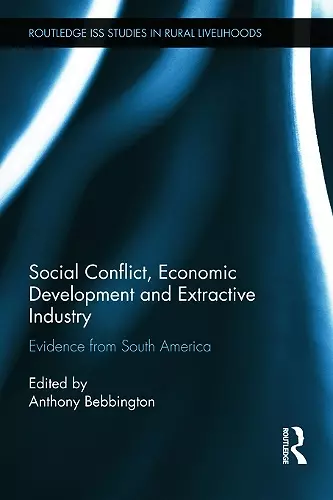Social Conflict, Economic Development and Extractive Industry
Evidence from South America
Format:Paperback
Publisher:Taylor & Francis Ltd
Published:8th Aug '13
Currently unavailable, and unfortunately no date known when it will be back
This paperback is available in another edition too:
- Hardback£150.00(9780415620710)

The extraction of minerals, oil and gas has a long and ambiguous history in development processes – in North America, Europe, Latin America and Australasia. Extraction has yielded wealth, regional identities and in some cases capital for industrialization. In other cases its main heritages have been social conflict, environmental damage and underperforming national economies. As the extractive economy has entered another boom period over the last decade, not least in Latin America, the countries in which this boom is occurring are challenged to interpret this ambiguity. Will the extractive industry yield, for them, economic development, or will its main gifts be ones of conflict, degradation and unequal forms of growth.
This book speaks directly to this question and to the different ways in which Latin American countries are responding to the challenge of extractive industry. The contributors are a mixture of geographers, economists, political scientists, development experts and anthropologists, who all draw on sustained field work in the region. By digging deep into both national and local experiences with extractive industry they demonstrate the ways in which it transforms economies, societies, polities and environments. They pay particular attention to the social conflict that extraction consistently produces, and they ask how far this conflict might usher in political and institutional changes that could lead to a more productive relationship between extraction and development. They also ask whether the existence of left-of-centre governments in the region changes the relationships between extractive industry and development.
The book makes clear the immense difficulties that countries and regional societies face in harnessing extractive industry for the collective good. For the most part the findings question the wisdom of the development model that many countries in the region have taken up and which emphasises the productive roles of mining and hydrocarbon industries. The book should be of interest to students and researchers of Development Studies, Geography, Politics and Political Economy, as well as Anthropology.
‘This book has a subtle combination of dealing with practical social problems of development and rich academic insights. The complex development and welfare challenges in the emerging and underdeveloped economies of Latin America, that have implications for institutional changes, are well presented. In the process, it exemplifies the case of social conflict in South America showing that the same research work can be replicated for other developing and emerging economies of the world.’- Rupamanjari Sinha Ray, Area Chairperson, Economics Management Development Institute, India, Vision (16:1) 2012
ISBN: 9780415710718
Dimensions: unknown
Weight: 408g
258 pages